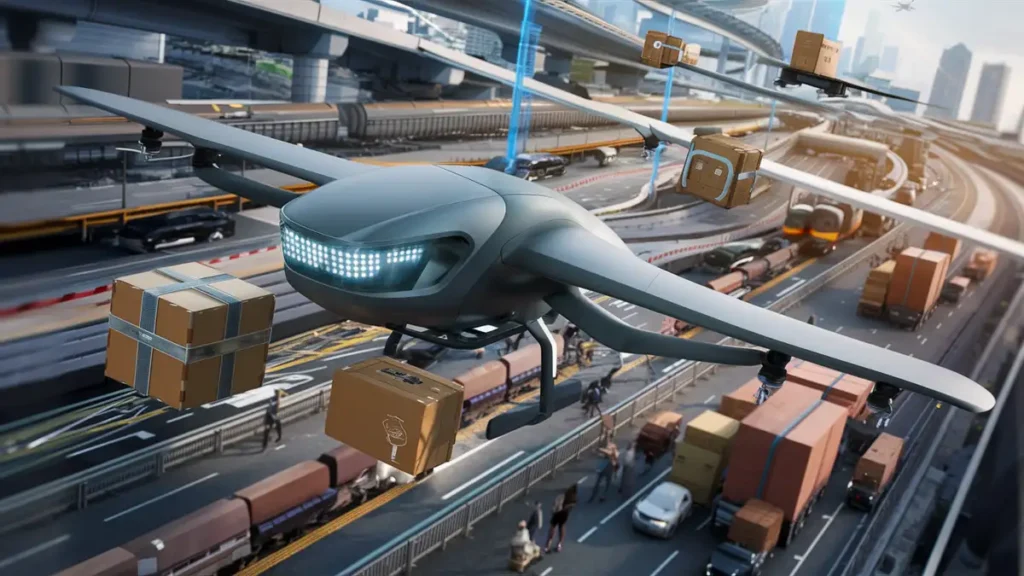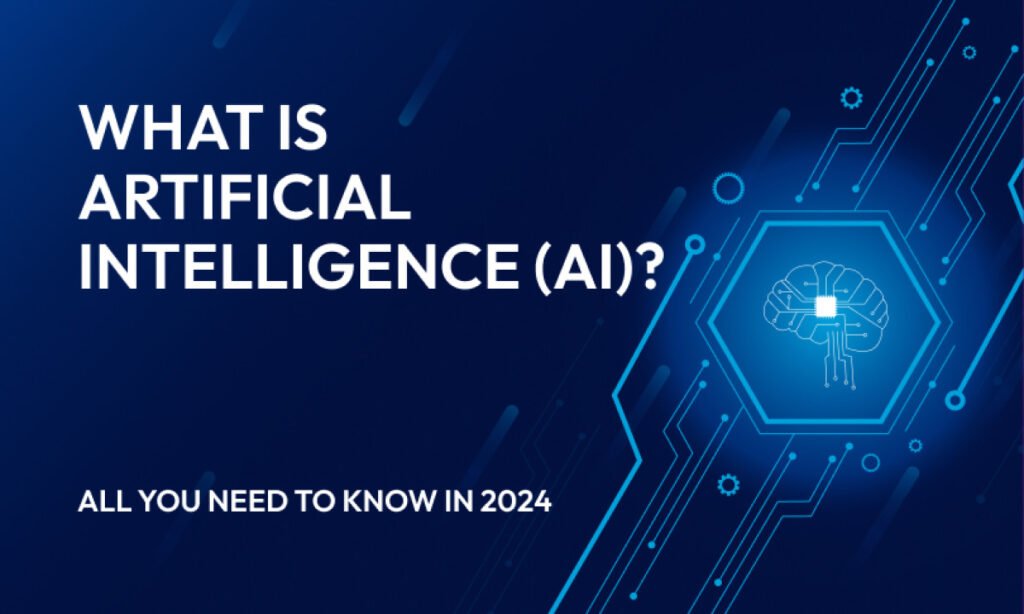Artificial intelligence is revolutionizing the logistics industry by effectively managing multiple variables. With AI in logistics projected to generate $1.3 to $2 trillion in annual economic value over the next 20 years, early adopters are already experiencing a profit boost of over 5%. AI in logistics improves efficiency through advanced warehouse operations and optimized delivery routes, significantly enhancing profitability
Artificial Intelligence (AI) is Transforming the Logistics Industry
AI is reshaping logistics by automating and optimizing processes that were traditionally manual and error-prone. Historically, the logistics sector struggled with significant challenges, including delays, high fuel costs, and operational inefficiencies. For instance, in 2021, 53% of merchants reported experiencing package delays, and traffic congestion alone cost the industry $74.5 billion annually.
AI in Logistics: The Impact
- Productivity Boost: Looking ahead, AI is expected to increase logistics productivity by over 40% by 2035. This boost in productivity will result from AI’s ability to streamline operations, anticipate disruptions, and make data-driven decisions, ultimately leading to a more efficient and effective logistics network.
- Cost Reduction: AI dramatically lowers warehouse operation costs by up to 50%. By automating tasks such as inventory management and order processing, AI reduces the need for manual labor and minimizes errors, leading to substantial cost savings.
- Efficiency: AI enhances operational efficiency through predictive analytics, which helps manage potential delays and optimize delivery routes. This not only saves valuable time and reduces fuel consumption but also ensures faster and more reliable deliveries.
- Accuracy: AI improves operational accuracy by automating complex tasks that were previously prone to human error. From sorting packages to tracking inventory, AI systems ensure precision and consistency, reducing costly mistakes.
8 AI Use Cases in Logistics
AI is revolutionizing the logistics industry by automating and optimizing various processes. Here’s how AI is transforming logistics operations:
- Automated Warehousing AI-powered robots are taking over manual warehouse tasks like sorting and shuttling goods. Machine learning algorithms adapt warehouse organization based on predicted demand patterns, while computer vision ensures precise inventory tracking. This shift from labor-intensive operations to advanced automation improves efficiency and accuracy.
- Demand Forecasting AI enhances demand forecasting by analyzing diverse variables, including weather patterns and regional events, alongside historical data. This results in highly accurate predictions, improving cost management, customer satisfaction, and overall supply chain effectiveness. As AI continuously learns from new data, its forecasting accuracy improves over time.
- Predictive Maintenance and Damage Detection AI uses sensor data to predict equipment failures before they occur, allowing for proactive maintenance and reducing downtime. Additionally, AI-driven computer vision identifies and classifies damage to goods, enabling quick resolution and minimizing losses.
- Stock Level Optimization AI optimizes stock levels by analyzing historical sales data and real-time demand to predict future needs. This dynamic approach reduces overstock and stock-outs, leading to significant cost savings and enhanced customer satisfaction.
- Supply Chain Optimization AI improves supply chain efficiency by integrating demand forecasting, dynamic route planning, predictive maintenance, and supplier relationship management. It reduces errors, minimizes downtime, and enhances overall supply chain resilience.
- Dynamic Pricing AI enables dynamic pricing by analyzing real-time market trends, competitor pricing, and customer behavior. This results in optimal pricing strategies that maximize sales and profits while boosting customer satisfaction.
- Route Optimization AI algorithms analyze delivery points, traffic patterns, and road conditions to determine the most efficient routes. This reduces travel time, costs, and carbon emissions, while real-time adjustments ensure timely deliveries with documented efficiency gains of up to 30%.
- Automating Document Processing AI automates document processing using Optical Character Recognition (OCR) and Natural Language Processing (NLP) to extract and manage information from both physical and digital documents. This speeds up data entry, reduces errors, and enhances operational efficiency.
AI in Logistics: Innovations by Leading Companies and Startups
Artificial Intelligence (AI) is revolutionizing logistics and supply chain operations, leading to significant efficiencies and cost savings. A recent survey indicates that 36% of businesses have successfully integrated AI into their logistics processes, with 28% preparing to do so. Here’s a look at how major companies and innovative startups are leveraging AI in logistics:
Amazon
Amazon, a global e-commerce leader, integrates AI to streamline various logistics functions. Their AI-driven systems enhance demand forecasting and inventory management. In their warehouses, Amazon employs around 200,000 AI-powered robots for picking, packing, and sorting, which boosts efficiency and minimizes errors. Additionally, Amazon is exploring AI for drone deliveries and self-driving trucks, aiming to optimize logistics operations further and improve delivery accuracy.
FedEx
FedEx utilizes AI to refine its parcel sorting processes. Their AI-enabled sorting robots can handle up to 1,200 parcels per hour, significantly speeding up operations. FedEx also applies AI for predictive analytics, forecasting potential delivery delays caused by weather or traffic conditions. This proactive approach enhances overall customer experience and operational reliability.
Nuro
Nuro is transforming last-mile delivery with its AI-powered autonomous vehicles. Founded by former Google engineers, Nuro focuses on unmanned deliveries, offering an environmentally friendly and efficient logistics solution. Their AI-driven vehicles aim to reduce human-driven errors, alleviate traffic congestion, and cut carbon emissions, representing a significant shift in traditional delivery models.
ClearMetal
ClearMetal harnesses AI-driven predictive analytics to address inefficiencies in the shipping industry. Their algorithms provide precise tracking, forecasting, and management of container logistics, reducing costs associated with mismanaged goods and underutilized shipping containers. ClearMetal exemplifies how AI can convert complex data into actionable insights, optimizing logistics operations and saving costs.
GreyOrange
GreyOrange showcases the impact of AI-powered robotics on warehouse and fulfillment center operations. Their advanced robots combine AI with machine learning to pick, sort, and pack goods with exceptional speed and accuracy. This automation reduces human error, accelerates delivery timelines, and allows human workers to focus on more strategic tasks, enhancing overall efficiency in logistics.
Challenges in AI Adoption in Logistics
Implementing AI in logistics offers numerous benefits, from enhanced demand forecasting and supply chain management to improved fulfillment and last-mile delivery. However, several challenges can impede the adoption of AI technology. These challenges span strategic, operational, and technical areas, impacting businesses in various ways.
1. Cost of Implementation and Maintenance
Implementing AI requires substantial investment in hardware, software, and infrastructure. In 2023, companies are expected to spend an average of €267 per employee on software, highlighting the need for careful budget management. The costs don’t stop at implementation; ongoing maintenance, updates, and employee training also add to the expense. For smaller companies or those with limited budgets, these costs can be a significant barrier to adopting AI technology fully.
2. Lack of Resources and Expertise
AI is a relatively new and complex technology that many businesses struggle to implement due to a shortage of technical expertise. A 2011 McKinsey & Company study projected a significant shortfall in analytical skills by 2018, with the U.S. facing a deficit of 140,000 to 190,000 professionals skilled in deep analytics. This shortage has only worsened, making it challenging for companies to find and train employees capable of managing and leveraging AI systems effectively. The cost of hiring and training skilled personnel further increases the overall investment required for AI adoption.
3. Concerns Around Privacy and Security
AI systems often handle sensitive customer data, raising concerns about privacy and security. Historical cybersecurity breaches have made businesses wary of technology solutions. For example, in April 2021, C&C Group’s IT systems were shut down due to a security incident, forcing Bulmers to fulfill orders manually while restoring online capabilities. Such incidents highlight the risks associated with AI and underscore the need for robust security measures to protect sensitive information.
4. Strategic and Operational Hurdles
Adopting AI involves strategic and operational challenges, such as determining the right areas to focus on and establishing clear processes and governance structures. Companies must decide where AI can add the most value and ensure that the necessary data types and interfaces (APIs) are in place. Without a clear strategy and governance framework, AI projects may fail to deliver the expected benefits.
5. Data Management and Integration
Effective AI implementation depends on the quality and integration of data. Businesses need to ensure they have the right data types and systems in place to support AI applications. Poor data management can lead to inaccurate results and undermine the effectiveness of AI solutions. Companies must invest in data infrastructure and processes to ensure their AI systems can access and utilize high-quality data.
Addressing these challenges is crucial for businesses to fully realize the potential benefits of AI in logistics. By overcoming these hurdles, companies can unlock the transformative power of AI to enhance efficiency, accuracy, and overall performance in their operations.
FAQs About AI in Logistics
1. What is the role of AI in ecommerce logistics?
AI is pivotal in ecommerce logistics, enhancing various aspects of the supply chain. It helps with:
- Route Optimization: AI algorithms find the fastest, most cost-effective delivery routes.
- Predictive Maintenance: Anticipates and addresses potential equipment failures before they disrupt operations.
- Inventory Management: AI improves stock levels and reduces waste by predicting demand.
- Demand Forecasting: Uses historical data and trends to predict future product needs.
- Customer Service: AI chatbots and automated systems provide prompt, accurate responses to customer inquiries.
2. How is ecommerce logistics different from traditional logistics?
While both logistics types manage the movement of goods, they differ significantly:
- Traditional Logistics: Focuses on the supply chain involving manufacturers, distributors, and retailers. It emphasizes the movement of goods across various stages in a broader supply chain.
- Ecommerce Logistics: Concentrates on fulfilling online orders, including steps like order processing, picking, packing, and last-mile delivery. It requires faster turnaround times and higher accuracy due to customer expectations for speedy and correct deliveries.
3. How can AI help businesses reduce costs in ecommerce logistics?
AI reduces costs by:
- Optimizing Delivery Routes: Minimizes fuel consumption and travel time.
- Predicting Maintenance Needs: Reduces unexpected downtime and repair costs.
- Avoiding Overstock and Waste: Enhances inventory management and reduces excess inventory costs.
4. What are the benefits of using AI in ecommerce logistics?
Implementing AI offers numerous advantages:
- Reduced Downtime: Predictive maintenance keeps systems running smoothly.
- Improved Delivery Times: Efficient route planning and order processing speed up deliveries.
- Enhanced Driver Safety: AI systems monitor and improve driving conditions.
- Increased Inventory Accuracy: Better stock management reduces errors and waste.
- Faster Order Fulfillment: Streamlined processes lead to quicker order processing.
- Accurate Sales Predictions: AI forecasts help in planning and stocking effectively.
- Better Supply Chain Planning: Improved logistics planning optimizes the entire supply chain.
- Responsive Customer Service: AI handles inquiries quickly and accurately.
5. Is AI replacing human workers in ecommerce logistics?
AI is not replacing human workers but rather augmenting their roles. It automates repetitive tasks and provides data-driven insights, enabling employees to focus on more complex, strategic activities and make better decisions.
6. How can businesses implement AI in ecommerce logistics?
To implement AI effectively:
- Identify Key Areas: Determine where AI can offer the most value.
- Explore Solutions: Evaluate available AI technologies or develop custom solutions.
- Train Employees: Ensure staff are trained to integrate AI solutions into existing workflows and operations.
7. How can software solutions help logistics companies reduce overheads?
Software solutions cut overheads by automating manual tasks, such as order processing and fulfillment. This reduces labor costs, minimizes errors, and speeds up operations, leading to significant cost savings and operational efficiency.
AI is undeniably transforming the logistics industry, offering innovative solutions to enhance efficiency, reduce costs, and improve service quality. As technology continues to evolve, businesses that leverage AI will be well-positioned to thrive in an increasingly competitive landscape. Embracing AI in logistics not only provides a competitive edge but also contributes to a more agile and responsive supply chain.







Pingback: The Ultimate Guide To Convolutional Neural Network (CNNs): 10 Key Concepts On What CNNs Are, How They Work, And Their Real-World Applications - IntellicoBlitz
Pingback: What Is Business? 7 Expert Insights On Powerful Business Models, Objectives, And Types - IntellicoBlitz
Pingback: What Is Artificial Intelligence? Could Machines Be Capable Of Genuine Thought? - IntellicoBlitz
Thankyou for all your efforts that you have put in this. very interesting information.
Right now it appears like Movable Type is the top blogging platform out there right now. (from what I’ve read) Is that what you are using on your blog?
I got what you intend,saved to bookmarks, very decent internet site.
I don’t usually comment but I gotta state thanks for the post on this perfect one : D.
hello!,I really like your writing so much! share we communicate more about your post on AOL? I require an expert on this space to solve my problem. Maybe that is you! Having a look ahead to peer you.
Woh I enjoy your content, saved to favorites! .
I do consider all of the ideas you’ve presented in your post. They’re really convincing and can certainly work. Nonetheless, the posts are very brief for starters. Could you please prolong them a bit from next time? Thanks for the post.